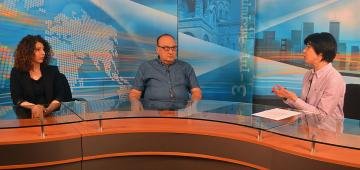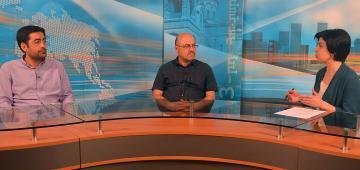 |
Between Justice and Vendetta
How to establish the rule of law and not abuse the rights? How to punish the perpetrators and form a consolidated society?
Civil Society Institute Director Artak Kirakosyan and political scientist Gor Hakobyan discuss the topic.
The conversation is hosted by Anna Sargsyan.
|
 |
Political Crisis or Rapid Changes
Armenia has been undergoing active public changes over the last two weeks. The motive of the process is political, but the changes bring in new public consciousness and behavioral norms. What are they, where the Armenian society is heading towards?
The topic is discussed by media expert Tsovinar Nazaryan and essayist, Director of the Eurasia Partnership Foundation Gevorg Ter-Gaberielian.
The conversation is hosted by Anna Sargsyan.
|
 |
The Revolution in Education System
The revolution of open hands has already one hot-spot – the educational system. The locomotive of the movement is the studentship. Will that collision lead to the conflict of generations, conflict of emotions - enthusiasm and despair?
The topic is discussed by psychologist Anush Alexanyan and education expert Serob Khachatryan.
The conversation is hosted by Anna Sargsyan.
|
 |
The Emotions of Revolution
The national uprising in April denied physical violence and succeeded. It even turned into a celebration, with all the participants having their own expectation. And what was the manifestation of aggression and anxiety? What psychological problems are we going to face after "the holidays"?
The subject is discussed by psychologists Marina Serobyan and Samvel Khudoyan.
The conversation is hosted by Anna Sargsyan.
|
 |
Velvet Power of Revolution
Inexplicable, unimaginable, unexpected. This is how the all-Armenian national protest – velvet revolution described. What was the source of the power? How did the revolution reject violence, enter our daily life and create new social situation?
The topic is discussed by conflictologist Arsen Kharatyan and cultural anthropologist Aghasi Tadevosyan.
The conversation is hosted by Anna Sargsyan.
|
 |
Independence and the Movement
What was the perception of the concept of Armenia’s autonomy during the first days of the Kharabakh Movement? What was the specific characteristics of the Movement within the territory of the Soviet Union? Lawyer Vardan Harutyunyan and Deputy of the Supreme Council Azat Arshakyan remember and discuss the past ongoings. The conversation is hosted by Anna Sargsyan.
|
 |
The Movement in Artsakh: from Underground Fight to the Freedom War
What background processes were in charge in the Autonomous Region of Nagorno Karabakh before the historical rally in Stepanakert on February 13, 1988? How did the Armenians of Artsakh interpreted?
The pavilion of Third Millennium hosted the First Commander of Nagorno Karabakh Self-Defence Forces Arkadi Karapetyan.
The conversation is hosted by Anna Sargsyan.
|
 |
Studying the Movement
In February 2018, the comprehensive historical research titled “History of Karabakh Movement (1988-1989)” was published.
The pavilion of Third Millennium hosted the author of the book, PhD in History Ashot Sargsyan.
The conversation is hosted by Anna Sargsyan.
|
 |
Karabakh Movement: Legitimate Revolution
How did the Armenian nation get this self-organized, positioned itself against Moscow and defeated it? Was that a revolution? The topic is discussed by the member of the unrecognized Karabakh Committee Davit Shahnazaryan and political expert Ruben Mehrabyan.
The conversation is hosted by Anna Sargsyan.
|
 |
The Drivers of the Karabakh Movement
What was the cause of Karabakh movement, what did the Armenian people demand back in 88? How did the independence process of Armenian and Nagorni Karabakh set off? The topic is discussed by the Doctor of Historical Sciences Harutyun Marutyan and Director of the Armenian Center for National and International Studies Manvel Sargsyan.
The conversation is hosted by Anna Sargsyan.
|
 |
Participants of Karabakh Movement
How did Karabakh movement take its start in Artsakh? Who were the participants and leaders of the Movement? Deputies of the RA Supreme Council (1990-1995) Kim Balayan and Gevorg Baghdasaryan recollect and discuss the topic.
The conversation is hosted by Anna Sargsyan.
|
 |
Accounts of Karabakh Movement
How is the Karabakh movement narrated in the textbooks, official presentations, public-political speech? What takes the most part in the happenings of 1988-1991 – the fight for democracy, or national-liberation tendencies? The topic is discussed by ethnographer Satenik Mkrtchyan and political expert Mikayel Zolyan.
The conversation is hosted by Anna Sargsyan.
|
